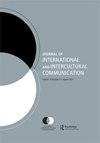For the love of music: Changing Whites’ stereotypes of Asians with mediated intergroup musical contact
IF 2.2
Q2 COMMUNICATION
Journal of International and Intercultural Communication
Pub Date : 2021-10-12
DOI:10.1080/17513057.2021.1985590
引用次数: 4
Abstract
ABSTRACT This study examined whether stereotypes of warmth and competence can be changed through exposure to outgroup musical behavior. We hypothesized that exposure to an outgroup musician would result in more perceived outgroup warmth, reduced intergroup anxiety, and more pro-diversity attitudes relative to nonmusical outgroup exposure, and that these effects would be mediated by target warmth, synchronization, empathy, and trust. The hypotheses were tested in the context of anti-Asian prejudice early in the COVID19 pandemic. We found substantial support for our mediator predictions: experimental exposure to an Asian musician yielded more positive warmth and synchronization perceptions, for instance, than exposure to an Asian nonmusician. Those perceptions were subsequently associated with more positive perceptions of Asians as a group.对音乐的热爱:通过群体间音乐接触改变白人对亚洲人的刻板印象
摘要本研究考察了对热情和能力的刻板印象是否可以通过接触外群体音乐行为而改变。我们假设,与非音乐外群体接触相比,接触外群体音乐家会产生更多的外群体温暖感,减少群体间焦虑,以及更支持多样性的态度,这些影响将通过目标温暖、同步、共情和信任来调节。这些假设在covid - 19大流行早期的反亚洲偏见背景下得到了检验。我们发现了对我们的中介预测的大量支持:例如,与接触非音乐家的亚洲人相比,接触亚洲音乐家的实验产生了更积极的温暖和同步感知。这些看法随后与对亚洲人作为一个群体的更积极的看法联系在一起。
本文章由计算机程序翻译,如有差异,请以英文原文为准。
求助全文
约1分钟内获得全文
求助全文
来源期刊

Journal of International and Intercultural Communication
COMMUNICATION-
CiteScore
3.80
自引率
12.50%
发文量
19
 求助内容:
求助内容: 应助结果提醒方式:
应助结果提醒方式:


